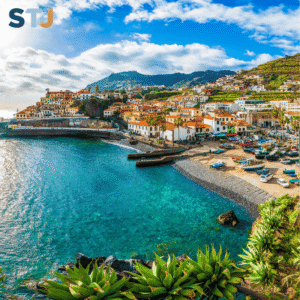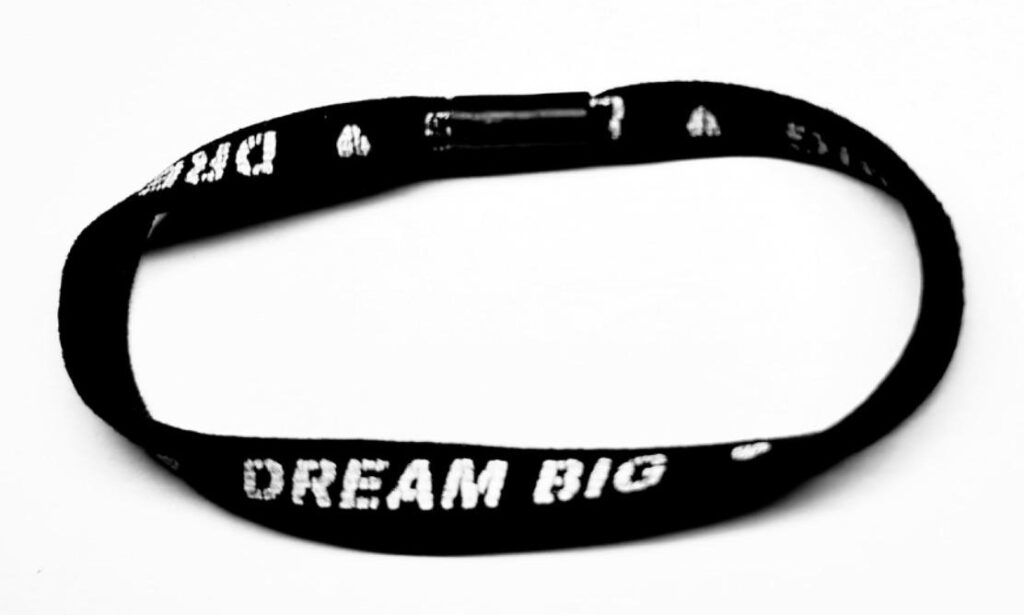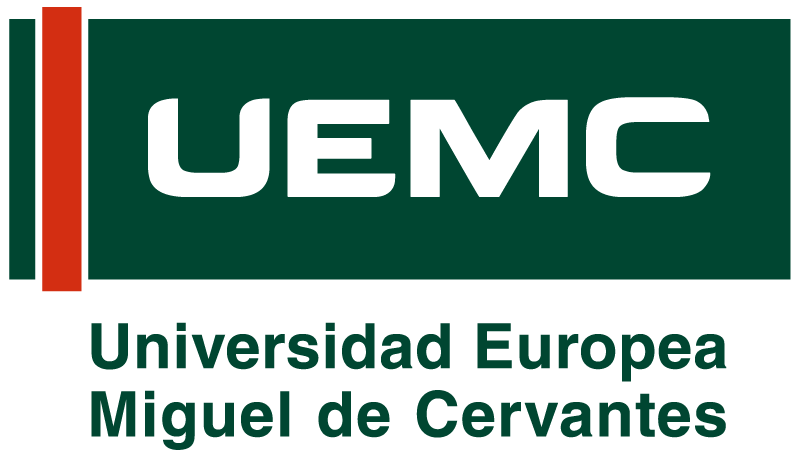By Kessler Lite
The cursor hovered over the “Book Flight” button at 00:15, the blue glow of my laptop screen the only light in my dark apartment. My finger trembled above the trackpad. Six hours until the flight to Madeira. Six hours to decide if I was really living or just surviving.
“Life was made up by people who are no smarter than you.” Steve Jobs’ words echoed from Christian LeBlanc’s video, the one I’d watched seventeen times in the past month. The healthcare scrubs hanging on my bedroom door seemed to mock me in the darkness, their sterile blue fabric a reminder of twenty years spent in fluorescent-lit corridors, saving lives while slowly losing my own sense of purpose.
The apartment was silent except for the hum of my laptop fan and the distant sound of traffic outside. My coffee had gone cold hours ago, the ceramic mug leaving a ring on the wooden desk where I’d been sitting, paralyzed by possibility and fear. The Nomad Escape website glowed on my screen, promising transformation in a place I’d never been, with people I’d never met.
I clicked “Purchase.”
The confirmation email arrived instantly, as if the universe had been waiting for this moment of reckless courage. Flight EI3847 to Funchal, departing in six hours. No return date selected. For someone who planned everything months in advance, who kept backup plans for backup plans, this felt like jumping off a cliff without checking if there was water below.
I came to Madeira not knowing that a YouTube video and a community of strangers would shatter twenty years of healthcare routine and launch me toward a life I’d only watched others live online. What started as a desperate escape from burnout would become my education in how digital communities can inspire real-world transformation, proving that sometimes the most profound journeys begin not with a destination, but with a decision to trust strangers who understand your dreams better than your closest friends.
This is the story of how I learned that courage isn’t the absence of fear, it’s feeling the fear and booking the ticket anyway.

The Spark in the Algorithm
Three months earlier, I was scrolling through YouTube in my hospital break room, still wearing scrubs that smelled of antiseptic and exhaustion. The fluorescent lights buzzed overhead, casting everything in that familiar institutional pallor that had become the backdrop of my life. My lunch sat untouched, another pre-packaged sandwich that tasted like cardboard and compromise.
The video that changed everything appeared in my recommended feed with an innocuous title: “Are You Really Living?” The thumbnail showed a young man falling in a swimming pool, arms spread wide, facing the sky. Something about his expression, a mixture of joy and determination, made me click.
Christian LeBlanc’s voice filled my earbuds, speaking directly to the part of me I’d buried under two decades of responsibility and routine. “Five years ago, I was unhappy. I was sick, and I thought this is how life had to be.” His words hit like a diagnosis I’d been avoiding. “The crazy thing is, I was just about ready to accept it, to let life pass by me as I sat there, alone and isolated in my little cubicle.”
I paused the video, looking around the break room where I sat alone, surrounded by the detritus of other people’s hurried meals. The parallel was uncomfortable and undeniable.
When Christian described his physical symptoms, the stress-induced health problems, the doctor visits that revealed nothing wrong on paper, I felt a chill of recognition. My own twitchy eye, the muscle spasms I’d attributed to long shifts, the way getting out of bed had become a daily negotiation with despair.
But it was the question that followed that stopped my world: “Does anyone in this office have a life that I aspire to live?”
I looked through the break room window at the corridor beyond, watching my colleagues shuffle past in their scrubs, shoulders hunched with the weight of another shift. Good people, dedicated people, but none of them seemed to carry the spark I remembered having once, long ago, before the system ground it out of me.
The answer was simply no.
The Community That Understood
The Funchal airport was smaller than I’d expected, its windows framing volcanic peaks that rose from the Atlantic like ancient guardians. The Portuguese announcements over the intercom sounded musical after years of hospital PA systems barking medical codes. “Bem-vindos à Madeira” – welcome to Madeira – the first phrase I’d learn in a language that would soon represent possibility.
Michelle Maree was waiting in the arrivals area, exactly as she’d described herself on our video call: warm smile, confident posture, the kind of person who made you feel like you’d been friends for years within minutes of meeting. But it was her eyes that struck me most, the way they seemed to see not just who I was, but who I could become. “You actually did it,” she said, embracing me like an old friend. “You booked that ticket.”
“I’m still not sure why,” I admitted, shouldering my hastily packed backpack.
“Because something inside you knows you’re ready for more,” she replied. “That’s why you’re here.”
The drive to the villa wound through terraced hillsides where banana plants grew in impossible abundance, their broad leaves catching the Atlantic breeze. Michelle pointed out landmarks, but I was only half-listening, my mind still processing the magnitude of what I’d done. Twenty-four hours ago, I’d been checking medication dosages and monitoring vital signs. Now I was in a Portuguese archipelago, about to spend a week with entrepreneurs I’d never met, learning skills I wasn’t sure I possessed.
The villa perched on a cliff overlooking the ocean, its white walls and red tile roof quintessentially Mediterranean. Through the windows, I could see people gathered in the living room, laptops open, engaged in animated conversation. These were the digital nomads I’d only read about, the location-independent professionals who’d figured out how to make geography optional.
“Nervous?” Michelle asked, noticing my hesitation at the threshold.
“Nervoso,” I replied, attempting Portuguese. “Very nervous.”
“Perfect,” she laughed. “That means you’re about to grow.”
The Bracelet Moment
The introductions began that evening, twelve strangers arranged in a circle in the villa’s living room. The Atlantic stretched endlessly beyond the windows, painted gold by the setting sun. I could smell the salt air mixed with the faint aroma of the local wine someone had opened, hear the gentle crash of waves against the cliffs below.
When my turn came, I felt my heart hammering against my ribs. These people had businesses generating six and seven figures annually. They spoke casually of clients in different time zones, of revenue streams and passive income, of lives designed around freedom rather than obligation. What did I have to offer this conversation?
“My name is Kessler,” I began, my voice smaller than I’d intended. “I’m a healthcare worker. For twenty years.” The words felt heavy, loaded with all the weight of routine and resignation I’d carried for so long. “But I’m here because I want to change my life, and I honestly don’t know how.”
The silence that followed felt eternal. I’d exposed myself completely to these strangers, admitted my confusion and fear to people who seemed to have all the answers. My mouth was dry, my palms damp with nervous sweat.
Then Sarah, a woman with kind eyes and an Australian accent, stood up. She was perhaps forty, with the sort of calm confidence that comes from having navigated major life transitions successfully. In her hand was a small silver bracelet, simple but elegant. “Wait,” she said, her voice gentle but firm. “This is for you.”
She pressed the bracelet into my palm, and I felt the fabric texture against my skin. Two words were engraved in flowing script: DREAM BIG.

“I make these for people who need reminding,” she explained, her eyes meeting mine with an intensity that made me feel seen in a way I hadn’t experienced in years. “You just reminded yourself by being here. The fact that you booked that flight, that you’re sitting in this circle admitting you want something different, that’s already dreaming big.”
The weight of those tiny letters felt enormous, like they contained all the permission I’d been waiting for someone else to give me. Around the circle, heads nodded in understanding. These strangers, these successful entrepreneurs who could have dismissed my uncertainty, instead recognized something I was only beginning to see in myself.
“Obrigado,” I whispered, the Portuguese word for thank you feeling more appropriate than English in this moment of unexpected grace. “Thank you.”
“The hardest part is admitting you want to change,” said Marcus, a German who’d built a seven-figure consulting business from his laptop. “Everything else is just logistics.”
“Feel the fear and do it anyway,” Sarah added, settling back into her chair. “That’s not just a motivational poster quote. It’s a life philosophy. The fear never goes away completely, but you learn to dance with it instead of running from it.”
As the evening progressed and others shared their stories, I realized I wasn’t the only one who’d arrived at this moment through dissatisfaction and desperation. Emma had left a law career that was slowly killing her soul. James had walked away from a family business that felt like a beautiful prison. Lisa had spent years in corporate marketing, creating campaigns for products she didn’t believe in.
We were all refugees from lives that looked successful from the outside but felt hollow from within. The difference was, they’d found their way to the other side, and now they were showing me the path.
The Shift in the Landscape
During the week, we took time to explore Madeira. Driving past the massive banana plantations felt like flipping through a dream. The irrigation system, levadas, carried mountain water across the hillsides in a brilliantly simple design. Farmers opened and closed wooden gates to control the flow. It was ancient and genius at once.
One afternoon, we stopped at a waterfall pouring directly onto the road. I walked under it. The water was freezing, shocking against my skin, but I stood there, laughing. For once, I wasn’t calculating outcomes or bracing for trauma, I was just feeling.
The black volcanic sand on the beaches looked surreal, like we’d landed on another planet. And in the northwest, charred trees stood as silent witnesses to a wildfire that had scorched over 3,500 hectares. The air still smelled of ash, months later. Even here, paradise bore scars.
Monday morning at 10:00, I drank poncha, a traditional Madeiran cocktail, sweet and strong. Back home, I’d be scrubbing into surgery by now. Instead, I felt sunlight on my face and realized I was living the kind of Monday that once felt impossible.
The Return
We ended the retreat at Miradouro da Partilha, a clifftop lookout drenched in sunset. We laughed, took photos, and hugged goodbye. Some stayed longer. I couldn’t. I had to return.
The flight home felt heavier. I sat in silence, bracelet on my wrist, feeling like I’d left a chapter unfinished. The comfort of being around people who understood, without explanations, without defenses, was hard to leave. It had shown me what alignment feels like.
We still keep in touch through the online community. Some of them moved to new countries. Some pivoted their businesses. As for me, I made a decision that would take me one step closer to the life I glimpsed in Madeira:
I enrolled in the School of Travel Journalism.
Now, I’m learning to tell stories. To capture landscapes, cultures, and the human spirit. I want to build a YouTube channel, not for clout, but to share the world the way it hit me that week, real, raw, full of wonder.
A YouTube video sparked my journey. A community caught me mid-fall. And now, step by step, I’m becoming the person I was meant to be.
That’s what digital communities can do. They don’t just inspire you. They rewire your direction.
This article is part of the practical work carried out by the students of the Master’s in Travel Journalism.

